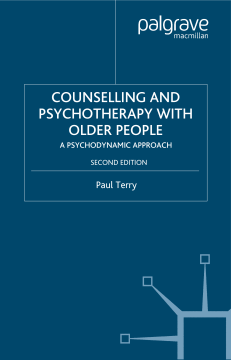
Additional Information
Book Details
Abstract
Building on the success of Working with the Elderly and their Carers, this new edition pursues an in depth understanding of therapy with older people. A wide range of clinical material and 3 new chapters draw on developments in psychodynamic theory and the author's experience to offer valuable insights for trainees and experienced practitioners.
PAUL TERRY is a lecturer in Counselling at Birkbeck College, University of London. He has taught psychodynamic counselling for many years at the same time whilst practising as a Consultant Clinical Psychologist and a Specialty Lead for Older People in the NHS.
Building on the success of Working with the Elderly and their Carers, this new edition pursues an in depth understanding of therapy with older people. A wide range of clinical material and 3 new chapters draw on developments in psychodynamic theory and the author's experience to offer valuable insights for trainees and experienced practitioners.
'Terry relates stories of humanity, generosity and compassion that are wholly accessible to therapists whatever their therapeutic orientation…He acknowledges that age has enabled him to find his own voice – and it is both eloquent and profound.' – Vee Howard-Jones, Therapy Today
Table of Contents
| Section Title | Page | Action | Price |
|---|---|---|---|
| Cover | Cover | ||
| Contents | vi | ||
| Acknowledgements | ix | ||
| Preface to the Second Edition | x | ||
| Part I: Direct Face to Face Therapy | 1 | ||
| 1 To Love Life and Mourn Its End | 3 | ||
| Introduction | 3 | ||
| Two seminal psychoanalytic studies of mourning | 4 | ||
| Mourning in infancy | 6 | ||
| Adult mourning | 9 | ||
| Projective identification and mourning | 10 | ||
| Fear of death | 12 | ||
| Summary | 16 | ||
| 2 Brief Interventions | 18 | ||
| Introduction | 18 | ||
| Illness, disability and bereavement | 18 | ||
| Further illustrations of bereavement reactions to illness and disability | 23 | ||
| Summary | 29 | ||
| 3 Longer Individual Therapy | 31 | ||
| Introduction | 31 | ||
| Dependency late in life | 31 | ||
| Long term effects of severe trauma | 45 | ||
| Some comments about therapy and the trauma of sexual abuse | 52 | ||
| Summary | 52 | ||
| 4 Therapy With an Older Man Who Had Lost His Speech | 54 | ||
| Introduction | 54 | ||
| Mr Mitchell – who had lost his speech | 56 | ||
| Summary | 69 | ||
| 5 Older Couples | 71 | ||
| Introduction | 71 | ||
| Some problems engaging older couples in therapy | 73 | ||
| Longer therapy with an older couple | 79 | ||
| Summary | 91 | ||
| 6 Groups for Very Frail Older People and Their Carers | 92 | ||
| Introduction | 92 | ||
| The group meetings | 95 | ||
| Patient and staff reaction to the group meetings | 106 | ||
| Summary | 106 | ||
| Part II: Indirect Therapeutic Consultations | 111 | ||
| 7 Ageist Attitudes and Behaviours | 113 | ||
| Introduction | 113 | ||
| The projection of core fears of ageing: dependency, loneliness and death | 114 | ||
| Summary | 122 | ||
| 8 Individual Consultations with Carers | 125 | ||
| Introduction | 125 | ||
| Recovery and despair – Barbara and Mrs Dulcie May | 127 | ||
| A persecuting grief – Melody and Mrs Ruth Scott | 130 | ||
| Aggressive behaviour and abuse – Betty and Mr Arthur Green | 133 | ||
| Pursuing suspicions of physical abuse | 136 | ||
| Summary | 138 | ||
| 9 Support Groups for Care Staff | 139 | ||
| Introduction | 139 | ||
| The York Support Group | 141 | ||
| Summary | 149 | ||
| 10 Teaching and Learning about Therapy with Older People | 150 | ||
| Introduction | 150 | ||
| Disability and vulnerability | 152 | ||
| Discharging feelings through questions | 155 | ||
| Guilt and vulnerability | 156 | ||
| Terror and dependency | 158 | ||
| Summary | 162 | ||
| References | 164 | ||
| Index | 168 | ||
| A | 168 | ||
| B | 168 | ||
| C | 168 | ||
| D | 168 | ||
| E | 169 | ||
| G | 169 | ||
| H | 169 | ||
| I | 169 | ||
| J | 169 | ||
| K | 169 | ||
| L | 169 | ||
| M | 169 | ||
| N | 170 | ||
| O | 170 | ||
| P | 170 | ||
| Q | 170 | ||
| R | 170 | ||
| S | 170 | ||
| T | 171 | ||
| U | 171 | ||
| W | 171 | ||
| Y | 171 | ||
| Z | 171 |
